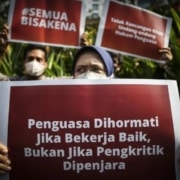
Morowali Industrial Park in Central Sulawesi. Photo by Mohamad Hamzah for Antara.
Indonesia’s president-elect, Prabowo Subianto, committed to deepening relations with China in a meeting with President Xi Jinping on Monday, 1 April. This reflects closer economic cooperation between China and Indonesia under the leadership of President Joko ‘Jokowi’ Widodo.
Some key Chinese projects in Indonesia include the recently launched China-Bandung high-speed train Whoosh; nickel industrial parks in Morowali and Halmahera; Rempang eco-city, a 7,000 hectare island development near Singapore; major hydropower projects in North Sumatra and North Kalimantan; Huawei and Alibaba’s cloud infrastructure; and TikTok’s recent acquisition of Indonesia’s largest e-commerce platform Tokopedia..
A recent report by Griffith University and Fudan University recorded that Indonesia was the single largest recipient (US $7.3 billion) of the US $20 billion in Chinese investment made in the Asia Pacific last year. Investments are mostly clustered in metal and mining projects, worth US $2.5 billion and US $1.7 billion, respectively.
For national elites, China is now widely seen as a providential partner whose capital and technology are pivotal for a development agenda centred on infrastructure, digitalisation and downstreaming activities. But while Chinese funding has helped Indonesia rise up the value chain, it is clear this comes at a high cost to local people and the natural environment, leading to exploitation, pollution and biodiversity loss.
The human costs of Chinese investment
A nickel rush in Indonesia by Chinese mining companies has helped the country become the world’s second-largest stainless steel producer. Chinese metals giant Huayou’s refineries have also boosted Indonesia’s nickel processing capacity.
While offering significant economic gains, Chinese investments are marred by labour conflicts and forced relocation. The nickel industry is illustrative of Indonesia-China economic cooperation and the failure of both sides to incorporate environmental, social and governance (ESG) considerations into a human security agenda. Human security focuses on comprehensive measures beyond traditional security measures to address issues that affect the everyday lives of people.
To be sure, Indonesia does have a National Strategy on Business and Human Rights (NSBHR), officially published as Presidential Regulation No. 60 of 2023. It guides stakeholders on how to ensure ESG compliance and conduct business responsibly. The implementation of NSBHR is supported by a taskforce, comprising line ministries, business associations and academics – at both the regional and national level – to ensure that business practices align with human rights principles.
Likewise, Beijing has reaffirmed its commitment to ESG. In 2022, the China Securities Regulatory Commission mandated the Shanghai and Shenzhen exchanges to amend rules to harmonise bond issuances with the country’s new ‘Green Bond Principles’ to combat greenwashing.
The China Chamber of Commerce of Metals, Minerals and Chemicals Importers and Exporters (CCCMC) has also recognised the importance of due diligence, and its 2022 guidelines highlight ‘responsible mining activities’ drawing heavily on OECD guidelines. Additionally, in early 2024, China unveiled new ESG disclosure rules to better align with global standards. The rules include new standardised reporting requiring firms to disclose the social and environmental impacts of their activities.
However, strong ESG performance is difficult to achieve in the mining and downstream sectors. The human security concept is applied so broadly that its policy value is easily compromised. Meanwhile, at the state level, human security is often fused with the national security concept so that everything is ultimately delineated through a securitisation lens.
As a consequence, the rush for nickel and batteries is no longer about protecting nature and people, but securing natural resources and generating jobs – human security is equated with the security of the nation and the state’s capacity to defend its sovereignty over natural resources.
Labour informalisation is reframing risk
There has been a lot of commentary about the ESG performance of Chinese companies in Indonesia. However, there is much less about the structure of the political economy underpinning these business activities – such as labour relations, informal networks, and how the interplay between elites and institutions shapes the ESG practices of Chinese firms and their Indonesian business partners.
For example, there have been alleged violations of Chinese and Indonesian workers’ rights at the Indonesia Morowali Industrial Park (IMIP) – the country’s largest nickel industrial area.
Nickel-processing companies sub-contract labour hire agencies to recruit workers. Typically, these workers are not provided with written contracts and are introduced to the job by friends from the same village, relatives or online advertisements on WeChat. Chinese workers have said their passports have been withheld, they suffered from respiratory problems and memory loss and were forced to work more than 12 hours per day. From the Indonesian side, a lack of local management and poor occupational health and safety rules are consistently highlighted as the most pressing concerns. Some companies in IMIP used poorly maintained furnaces and appointed Chinese workers to safety administrator positions even though they could barely speak the local language.
In late December 2023, an explosion at IMIP killed 18 people – ten Indonesian and eight Chinese workers – and injured dozens. Yet, despite grievances and petitions from civil society, cases were quickly closed, with subcontractors and Chinese furnace supervisors being held accountable. The political and economic networks based in line ministries, among policymakers and in local governments that enabled this to happen remain undisturbed.
These conditions constitute a projection of some Chinese firms’ labour practices at home, characterised by widespread labor casualisation through complex sub-contracting systems, low remuneration and a general lack of occupational safety and transparency.
However, labour conditions are not the sole cause of the problem. Law enforcement and the labour regulation policies of the state are important factors for reshaping the Chinese labour regime. But at the same time, Indonesian national authorities, whose interests are closely linked to downstream industry, rarely promote reforms that could make human security relevant to the deregulated labor markets serving the nickel rush. This gives leeway for irresponsible companies –local and Chinese – to profit from that exploitation.
The politics of environmental certification
On the environmental front, the Export-Import Bank of China has pledged support for a policy of no new coal power plants overseas. However, loopholes allow for captive coal plants to be constructed in industrial parks. Ironically, most of these plants power smelters and battery production facilities that are critical for the Indonesian government’s vision to turn the country into an EV powerhouse.
On the ground, the adverse impacts of these off-grid power plants are apparent. A combined 14 captive coal plants feed three Chinese industrial estates on Obi Island, Morowali and Weda Bay, with a total capacity of 12.6 GW. Poor waste management at these sites has resulted in biodiversity loss, air pollution and decreased water quality which has dramatically affected fisheries and local people’s livelihoods.
In recent years, Chinese companies have developed a series of corporate social responsibility (CSR) programs to improve their image and promote their social and environmental efforts. These programs take various forms – from school and mosque building to road repairs and reforestation. In 2022, for the first time, the China Chamber of Commerce in Indonesia issued a due-diligence report revealing successful CSR programs held by Chinese companies including PT IMIP and PT Virtue Dragon Nickel Industry. Undoubtedly, the adoption of CSR is a positive step, but poor implementation makes it ineffective as a means of addressing social and environmental problems rooted in the political-economic structure of Indonesia.
The reasons for this are twofold. First, there are still too many lenders in Indonesia continuing to finance coal power plants. State-owned banks are conflating their development mandate with commercial objectives and opt to fund smelter projects and off-grid plants that have been dubbed “national strategic projects”.
Second, the issuance of business licenses in Indonesia is based on the Omnibus Law (Law No. 6 of 2023 on Job Creation). Under the new law, the assessment of license applications occurs through a risk-based approach, where each business is assessed based on the potential for hazards. Businesses with a high-risk classification, such as mining, need to obtain certification from the central or regional government to confirm compliance with applicable standards.
However, escalating certification to higher levels of government does not necessarily guarantee environmental performance. Tempo recently reported numerous high-risk deals have been brokered by a tiny group of political elites. In this setting, the assessment is “politics as usual”, with licensing a by-product of negotiated compromises agreed among politicians, businesses and brokers. Risks are reconstructed, compromising human security and the health of the environment.
What lies ahead?
It is worth remembering this political economy is not unique to Chinese investment in Indonesia. China-linked projects are constantly in the spotlight because of the scale of these investments. Yet, this foreign investment model is widely embedded in the context of ‘doing business in Indonesia’, where regulatory loopholes and discretionary power of political elites offer protection to irresponsible companies.
Other leading sectors, such as oil palm plantations and coal mining, for example, are rife with elites and broker networks who work to preserve their interests through extended state power, relegating human security to the background.
Without a doubt the Chinese presence in Indonesia remains strong. The nickel industry aside, there are a series of new projects in the pipeline, including “Two Countries, Twin Parks”, which would establish a network of complimentary industrial parks in both countries, and green infrastructure projects, like major investments in solar panel downstream production capabilities.
As these investments come online, a coalitional force capable of asserting a stronger position on human security issues is critical for maximising the benefits of cooperation. The state should not act merely as a gateway for attracting investments, but also as a security guarantor for the people most affected by these projects.
Setting and enforcing codes of conduct and due diligence mechanisms for investors and stakeholders could be a starting point. Since 2010, Indonesia has been a member of Extractive Industries Transparency Initiative (EITI), a global standard to promote the open and accountable management of oil, gas and mineral resources. In its latest EITI report, Indonesia revealed revenue and social payments for domestic and Chinese companies, however, the report could have also included disclosures from nickel companies currently under scrutiny.
It is a step in the right direction but much, much more is needed.











